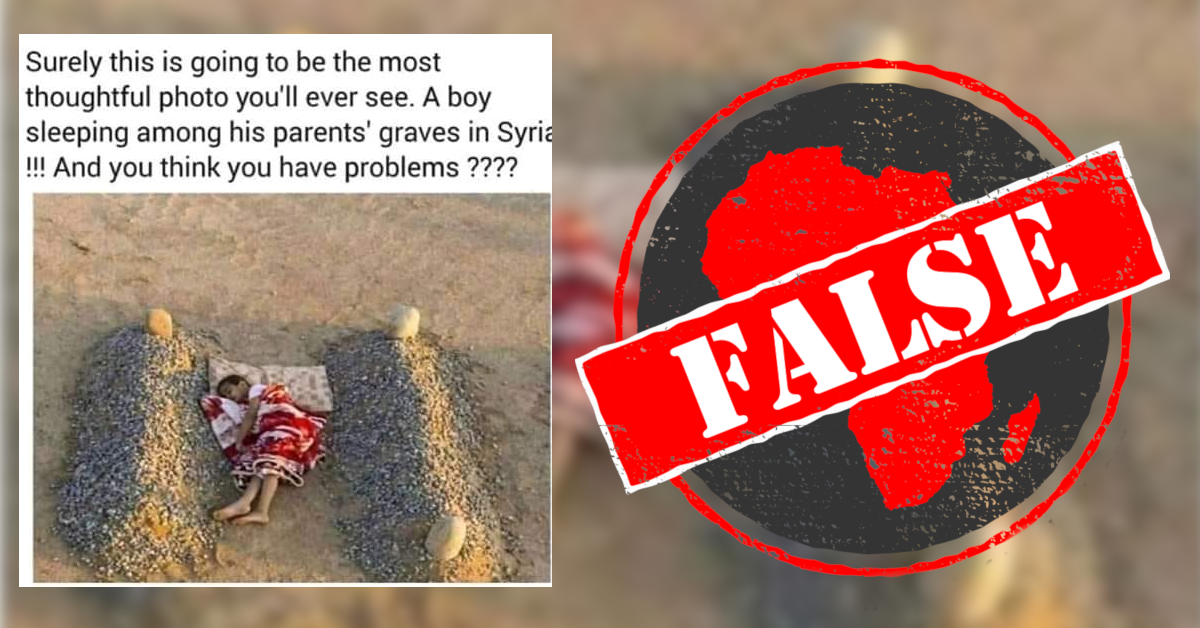A meme shared on Facebook in South Africa shows a boy lying with his head on a pillow between two mounds of stones.
“Surely this is going to be the most thoughtful photo you’ll ever see,” the text reads. “A boy sleeping among his parents’ graves in Syria !!!! And you think you have problems ????”
Is this what the photo shows?

Using a reverse image search we found the original photo on the Instagram account of photographer Aziz al Otaibi, from Riyadh in Saudi Arabia. It was posted on 7 January 2014.
Al Otaibi told the Lebanese website Beirut in January 2014 that the photo was staged with fake graves “as part of a conceptual project”.
“I'm a photographer and I try to talk about the suffering that is happening in society, it's my hobby and my exaggeration is intended to deliver my idea,” he said.
Al Otaibi posted another Instagram photo of the same boy sitting up between the “graves”, smiling and making a peace sign with his hand.
He told Beirut he posted the second photo to “put an end to its connection with children suffering in Syria”.
Dutch journalist Harald Doornbos also interviewed Al Otaibi, who confirmed that his photo had been used out of context.
It was taken on “the outskirts of Yanbu, 250 kilometres away from Jeddah”, in Saudi Arabia.
He told Doornbos the boy in the photos was his nephew, and that he had built the fake graves from stones.
Al Otaibi said he was annoyed that one of his photos was taken “totally out of context” and used for “propaganda”. – Taryn Willows
“Surely this is going to be the most thoughtful photo you’ll ever see,” the text reads. “A boy sleeping among his parents’ graves in Syria !!!! And you think you have problems ????”
Is this what the photo shows?

Part of ‘conceptual project’
Using a reverse image search we found the original photo on the Instagram account of photographer Aziz al Otaibi, from Riyadh in Saudi Arabia. It was posted on 7 January 2014.
Al Otaibi told the Lebanese website Beirut in January 2014 that the photo was staged with fake graves “as part of a conceptual project”.
“I'm a photographer and I try to talk about the suffering that is happening in society, it's my hobby and my exaggeration is intended to deliver my idea,” he said.
Al Otaibi posted another Instagram photo of the same boy sitting up between the “graves”, smiling and making a peace sign with his hand.
He told Beirut he posted the second photo to “put an end to its connection with children suffering in Syria”.
Photographer’s nephew in image
Dutch journalist Harald Doornbos also interviewed Al Otaibi, who confirmed that his photo had been used out of context.
It was taken on “the outskirts of Yanbu, 250 kilometres away from Jeddah”, in Saudi Arabia.
He told Doornbos the boy in the photos was his nephew, and that he had built the fake graves from stones.
Al Otaibi said he was annoyed that one of his photos was taken “totally out of context” and used for “propaganda”. – Taryn Willows
Republish our content for free
For publishers: what to do if your post is rated false
A fact-checker has rated your Facebook or Instagram post as “false”, “altered”, “partly false” or “missing context”. This could have serious consequences. What do you do?
Click on our guide for the steps you should follow.
Publishers guideAfrica Check teams up with Facebook
Africa Check is a partner in Meta's third-party fact-checking programme to help stop the spread of false information on social media.
The content we rate as “false” will be downgraded on Facebook and Instagram. This means fewer people will see it.
You can also help identify false information on Facebook. This guide explains how.


Add new comment